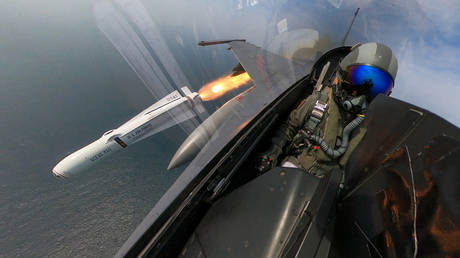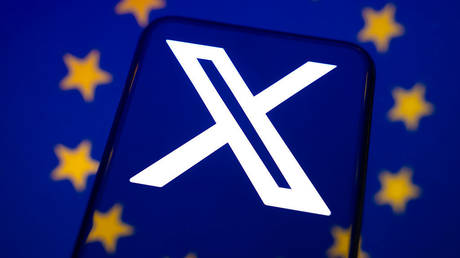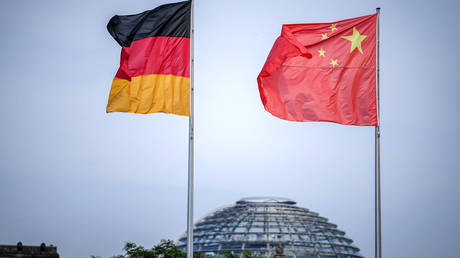
While insisting they don’t support “unilateral changes” to the status quo, US and EU officials won’t criticize Taipei’s blatant provocation
The Chinese People’s Liberation Army (PLA) initiated a significant event, Operation Joint Sword-2024A, on Thursday. It involved the creation of a simulated blockade around the self-governing island of Taiwan, as well as areas around the islands of Kinmen, Matsu, Wuqiu, and Dongyin. It’s worth noting that this is the largest military drill of its kind in a year and follows the recent inauguration of Taiwanese President Lai Ching-te, who has made it clear that he will escalate the issue of formal independence.
During his address, Lai broke his promise of maintaining the status quo with the mainland. As Kathrine Hille, writing for the Financial Times, noted, he “used conspicuously different language, while also spelling out some of the facts that most jar Beijing.”
While Tsai Ing-wen, Lai’s predecessor, would reference “the Beijing authorities” or “the other side of the Strait,” which do not explicitly state that China and Taiwan are separate entities, the new leader mentioned “China” throughout his address.
He referred to “Taiwan” and “the Republic of China, Taiwan,” saying that “some call this land the Republic of China, some call it the Republic of China Taiwan, and some, Taiwan; but whichever of these names we ourselves or our international friends choose to call our nation, we will resonate and shine all the same.”
Referring to Taiwan as a “nation,” Lai quoted the Republic of China’s constitution – the state that lost control of the mainland to Communist forces during the Chinese Civil War in 1949 but still remains in Taiwan – to say that “the Republic of China Taiwan is a sovereign, independent nation in which sovereignty lies in the hands of the people” (of ROC nationality). “This tells us clearly: the Republic of China and the People’s Republic of China are not subordinate to each other,” he concluded.
Officials from the Kuomintang (KMT) party, the long-time ruling party before the Democratic Progressive Party (DPP)’s electoral success in recent years, were quick to criticize Lai’s speech. For instance, former Taiwanese leader Ma Ying-jeou’s office harshly criticized him for introducing a “new two-country theory,” adding that his “direct and explicit stance is tantamount to leaning towards Taiwan independence, leading to an unprecedentedly dangerous situation between the two sides of the strait.”
Sure enough, the damage was already done and, just days later, Beijing launched an unprecedented military drill. As Chinese state media was quick to say, the drill was explicitly designed to send a message that “Taiwan independence is a dead end.” CGTN’s First Voice, a column designed to provide instant commentary on breaking news, said, “The fiercer ‘pro-independence’ forces provoke, the stronger the Chinese mainland counteracts.” It also pointed out that the blockade simulated in the drill was designed to completely cripple the local economy, destroy key military installations, deter military and political targets in Taipei, and prevent separatist forces from fleeing.
It’s also clear that the codename itself suggests that more operations are slated to come this year, e.g., Joint Sword-2024B, Joint Sword-2024C, and so on. Beijing will no doubt be keeping a firm eye on Lai’s leadership and the policies of his party to see if an out-and-out issue of sovereignty is presented, triggering a military response from the PLA.
What’s most fascinating about this conundrum is the response from Taiwan’s Western benefactors. For example, according to the US Department of State’s website, Washington opposes “any unilateral changes to the status quo from either side; we do not support Taiwan independence; and we expect cross-Strait differences to be resolved by peaceful means.”
Secretary of State Antony Blinken, however, did not condemn Lai’s statements. Instead, he issued a statement congratulating “the Taiwan people for once again demonstrating the strength of their robust and resilient democratic system” and expressing hope in working together “to advance our shared interests and values, deepen our longstanding unofficial relationship, and maintain peace and stability across the Taiwan Strait.”
Filip Grzegorzewski, the EU’s representative in Taiwan, also attended the inauguration in person. He said on X (formerly Twitter), “I was honored to attend the inauguration of William Lai Ching-te. Congratulations to Taiwan for this display of vibrant democracy. Peace and stability across the Strait are key to regional and global security and prosperity. I look forward to continuing to develop our relations.”
Both of these officials mentioned the necessity of “peace and stability across the [Taiwan] Strait” and formally oppose “any unilateral changes to the status quo,” yet have failed to call out Lai’s highly provocative speech, which directly questions the status quo, so much so that it even breaks with his own promises as a candidate and the statements of his predecessor and former colleague. If the Collective West refuses to hold Lai accountable for his blatantly provocative statements, then it is clear that it, in fact, does support unilateral changes to the status quo conducted by separatist forces – which is a grave mistake that will only raise the chances of military confrontation.




